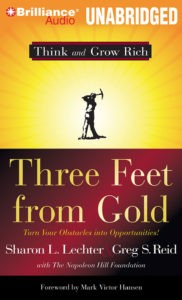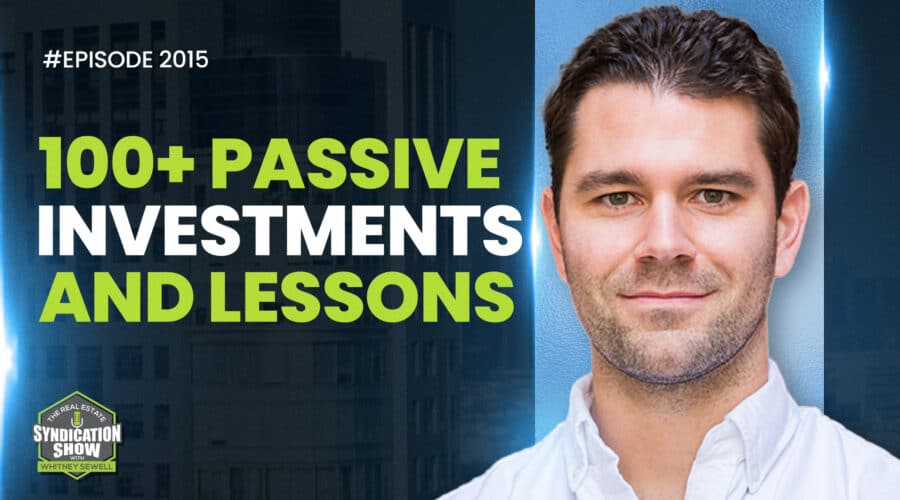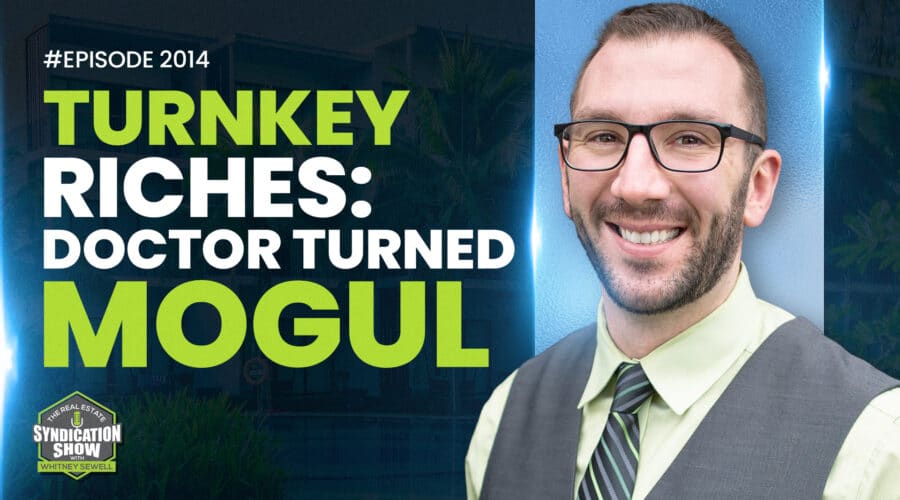Listen to the podcast here:
Real estate will always be tricky, and the only way to be successful in it is by having the right people educating you. Kyle Mitchell, the Managing Partner and Co-founder of Limitless Estates, shares the story of how he got started with investing in single-family real estate back in 2013 and eventually focused on syndication. Walking us through his first syndication deal, Kyle narrates the importance of coaching programs in preparing yourself for landing that first deal. Now, with the track record that he’s built, he shares some of the processes he’s implemented and some tips on how he built trust with investors.
Our Gracious Sponsor:
Are you wanting to learn how to gain financial freedom through having your own syndication business? Text LEARN to 474747 to begin to learn from one of the best in the industry, Vinney Chopra. Vinney came to the US with only $7 in his pocket, and now controls hundreds of millions of dollars of real estate he has acquired through multifamily syndication. He is now personally coaching others to do the same. Text LEARN to 474747 to begin your journey to starting your own syndication business! Vinneychopra.com
—
Watch the episode here:
The Impacts of Your First Deal with Kyle Mitchell
Our guest is Kyle Mitchell. Thanks for being on the show, Kyle.
Thanks for having me, Whitney.
I’m honored to have you on the show. I’ve been on his podcast as well, which I would highly recommend you check out. I know he’s going to tell you more about it. It’s a pleasure to have you on the show. Kyle is a real estate entrepreneur who closed on his first multifamily syndication. He’s Managing Partner and Co-Founder of Limitless Estates whose vision is to provide A-class living to lower-income housing by putting the residents first and installing a sense of community while inspiring others to do the same. He’s also the cohost of the weekly real estate podcast, Passive Income Through Multifamily Real Estate, where he speaks with various experts in the real estate industry to help educate and create clarity for passive investors.
With a background in operations management and logistics, he has overseen multimillion-dollar businesses and has a passion for doing the same in the multifamily syndication space. Kyle, I appreciate your time, you’re on the show sharing your journey where you’re at now in the syndication space. I know a lot of our audience is going to be able to relate to you as well, are going to appreciate your story and learn a lot. Get us started with a little bit about your background and let’s get right into how you got into this business.
Previously to being in real estate, I was in the golf management business. You can look at the golf management business as a third-party property manager in the real estate world. Cities, municipalities hire third-party golf management companies to come in and manage their properties for them. That’s what we did. I was a general manager and a regional manager for several years and oversaw about 250 employees and $20 million in revenue. In 2012, 2013 I bought my first investment property. It’s all downhill from there. I invested a little bit in the stock market and lost all my money. I got a bad taste from the stock market right off the bat. I said, “There’s got to be a different way.”
Like many people who read Rich Dad Poor Dad, and couple of other books, got started investing locally in the California market in real estate and had a bad experience. I put a professional tenant in place. The landlord-tenant laws out here in California are unfavorable to landlords. I quickly learned my lesson and started buying some out of state turnkey, single-family homes. I quickly realized it’s difficult to scale with, first of all, turnkeys and second of all, single-family homes. At that point, I learned about multifamily syndication and I dove right in.
You started with single-family. Tell me about the first property though. Was that 2013?
It’s right around 2013. I put 20% down on it and it was cash fun. In California, you can’t find that often, but it was a good little property. I put the wrong tenant in there. I trusted my agent to place that tenant. I have all the excuses in the book. I was busy at work. I didn’t want to be hands off. I should have definitely done my due diligence and put the work in. The first couple of months went fine. It was cashflowing. The rent stopped coming in. At that point, a few months in, I couldn’t get ahold of him anymore. They may give me $100 here, $100 there. I started the eviction process and my biggest mistake there was I didn’t hire an attorney. I wanted to do it myself to save a couple of bucks.
In California, I’m not sure about this in any other state, but if you accept any type of rent, whether it be $50 on $10,000 owed or less, you have to start the eviction process over from scratch from day one. I was a few months in. I got a letter from the court stating, “You’ve accepted rent. You’ve got to start over from day one.” Obviously, I was pretty frustrated at that point. I hired an attorney and a few months later, they’re out. A few months it took to get this tenant out. I ended up selling the house. I had my real estate license here in California as well. Net-net, I did make a little bit of money. I learned a lot. If you asked me if I would do it again, I probably would because of the amount I learned in that process. At that point, I decided to buy out of state. At the time, I needed some passive income. I was still working my full-time job, so I bought turnkey.
You’re still thinking, “Single-family but now we’re going to try a different market.” You try the turnkey, but what was it about syndication? How did you learn about syndication and know that this is the path I want?
[bctt tweet=”Real estate is a team sport. We can’t do it without a team. The stronger those teams are, the better you need to do in this industry.” via=”no”]
It’s Google. I knew I wanted to be in real estate. I love real estate. I love what it can provide for you. I couldn’t scale with single-family homes. I’d have to have 100 of them. It would take me many years. That wasn’t the path I wanted to take. I started listening to some podcasts, searching for some stuff online. I went on BiggerPockets and stumbled upon a couple of coaches that teach multifamily syndication. We bought a course. When I say we, it’s my fiancée and I. A few weeks later, we thought we were multifamily syndication experts. We jumped into the world, started going to seminars, started a meetup, our podcast, and eventually I left my job to do this full-time because I fell in love with it.
Give us a little bit of the timeline like quitting your job, do your first deal and let’s jump into that first deal.
December 2017 is when we first found multifamily syndication and started learning about it, going to seminars and meetups and all the like. In April of 2018, we started our own meetup. We started building our investor base and started visiting, picking markets, things like that. In November of that year, it got to the point where we felt like our investor base was strong enough. We had chosen our markets. We’ve built our teams out there. Our network was large enough. I left my job before we even closed on a property because I felt like we were close. For me, when I go into something, I’m the type that goes all in. I had the support of my fiancée, which was number one. She said, “Let’s do it.” We started a podcast the next month and made an offer, jotted under contract at the end of January. Negotiations and everything took a couple of months and we closed on back in May.
I know a lot of people are in that stage of, “When can I quit my job?” Everybody wants to do that. Congratulations to you on this first deal as well. Let’s talk about that first deal. How did you find that property?
You can say it was luck. My fiancée and I, on her day off and my day off during the week would drive to Tucson, Arizona. That drive is about seven-and-a-half hours long. The reason why we do that is number one, there’s not a direct flight until the afternoon, so the timing of it never worked with flying. We would have to stay overnight. We would wake up at 2:00, leave at 2:30 in the morning, and get there around 9:00 or 10:00. We would meet with brokers, meet with other investors, local people and tour properties. Come back and get home at 1:00 or 2:00 in the next morning. On one of those trips, we let the brokers know we’re going to be out there. I got a call from one of the brokers and said, “I got the keys to this place. I haven’t walked the units even myself. Would you want to walk it for me?” We were the first ones to tour the property. We got about a three-week head start until it went to market. By the time it went to market, we had already done all of our underwriting, our due diligence and felt comfortable with it. Day one, we put an offer in and we’re able to lock it up quickly.
Did the coaching program that you had supply all the confidence to be able to go through that deal and complete all of that?
That coaching program helped us out tremendously. Nothing prepares you for what you go through on your first syndication without going through it.
I couldn’t agree more. It does give you some confidence to have somebody to talk to or ask them questions?
You need a network. You need a team. Real estate is a team sport. We can’t do without that team. Even going forward now, we’re trying to build even stronger teams, stronger relationships because the stronger those are, the better you need to do in this industry.
I appreciate you sharing about the drive and your own syndication. Most people aren’t going to be willing to put that time in and that effort. I’m glad it’s paid off. It does. You got to be consistent. You got to be willing to keep going. You got to be willing to keep doing it. That was not easy on your all’s day off to keep doing that and driving that far. You’re willing to do that to make it happen.

It’s like that book Three Feet From Gold is what I kept telling myself is “Don’t give up when you’re right there and keep doing it.” We continue to do it. We fly sometimes and stay overnight because this is my full-time job. I have the availability to do that. We drove to Phoenix to look at some properties as well. You’ve always got to keep grinding and keep doing it. If you keep doing those things consistently, you’re going to breakthrough.
Would you give us more specifics about this property?
It’s 42 units in Tucson, two miles east of U of A. It’s a perfect first property for us. It’s a perfect value-add type of property. When we first went up to the property, first of all, it’s not being marketed anywhere. Even the phone number on the sign on the corner was the wrong phone number. I don’t even know how people were leasing up. That was sign number one. The seller once she had it on the market, had upgraded about half the units, but the property had not been painted in a long time. It wasn’t being marketed. The rents were not being pushed. There are people in there. They had been living in there since 2003 with the same rent, no month to month. Half the property was not on leases. It was a little bit scary going into it. Now that we’ve got it an under contract and going through everything, everything looks great. It’s 98% occupied right now. A new paint on it, rebranding it, new signage, obviously putting some marketing dollars behind it. We’ve already been able to rent up for market rents, pre-rehab.
How long do you plan to hold this?
It’s a six-year plan hold. However, every year we’re going to shop and see what we can get for it. If the market stays strong, we’ll likely be able to exit a little bit early. It is a plan six-year hold.
What’s a surprise that happened through this first deal that you didn’t know what was going to happen? It’s a big learning point that we could all learn from.
It’s dealing with the lender for me. I’m well studied. I listen to every podcast out there. I read all the books. I thought it was well prepared for this. Some of the things I learned about the lender experience was surprising to me. When they say that you need things like net worth and liquidity, those are bare minimums. If you barely meet the threshold, depending on the strength of your team, the lender is going to have to go into Fannie or Freddie for a waiver or an exception. If you don’t get that exception, your rate is going to be higher and your terms aren’t going to be as strong. It was a big learning experience. We had to switch lenders 30 days prior to close and bring on another team member to sign on a Fannie loan with us in order to get this thing closed. We ended up getting an 81-basis point discount because of the team and the rates happened to drop at the right time and all that stuff. That was probably the most stressful thing. It was the biggest learning curve. You can’t learn it without going through it. That’s one of the biggest things I learned.
You said you got a better rate because you use a different lender or you probably use your 30-day extension or something like that.
We were going to use our 30-day extension, but at that point, when I found the new lender that said, “We can do this,” because I had called everyone I could think of. I was getting told, “No, it’s too tight.” I finally found someone that said, “Yes. Got it done.” It was 29 days when we started the paperwork. We recorded about an hour before the deadline. It was an exciting time. I learned a ton.
What else about that property did you walk away saying, “The next deal we’re doing this differently?”
[bctt tweet=”Look at your goals and see where you feel most comfortable.” via=”no”]
Making sure you have the team lined up in advance was a big one. My fiancée and I thought that we could do it all on our own. We could raise all the money on our own. We raised about 90% of the funds ourselves. That was the biggest thing switching the lender as well as I was not transparent enough with the lender that we were going to bring on another GP if we weren’t able to raise that money. They had already applied and it was too late to have a GP. We had bail on that loan, start a new loan, and add the GP advance so that they can come aboard and help us finish with the raise. I would say, make sure that on day one you understand who your team is or at least who you need to be a part of that team in order to get it done.
What was the capital raise for that?
It was $1 million.
I’m impressed too that you all were able to raise $1 million by yourself and make it happen. Tell me about how you built that network. I know that this is what some of our audience wanted to know. This is your first deal. You were able to raise that capital. Most people are not going to be able to do that. No experience. You’re going to get all those questions. How did you build that track record or no track record in syndication at that point? How did you build that trust with these investors and how did you meet them?
A lot of the people that we have as investors were friends and family and the other we met through our meetup. We had been doing our meetup. When we started the raise, we had been doing our meetup for right about a year. We’ve been doing that on a monthly basis, having meetings. We knew the time was going to come. We need to build those relationships. We even with our friends and family would have meetings, talk about what we’re doing and getting the word out there. If we had done this a few months after we started the meetup, we would’ve not been prepared. You wouldn’t have had that investor database or even the trust in our investors. After a year of establishing that trust, showing people what we do by Facebook posts, LinkedIn and monthly emails. We had a drip campaign go out telling them about our company and what we do. It was not an easy process. It was a long-term process, but that’s how we look at our business is the long-term. We built it with that frame in mind. It took a year to build that list in order to be able to raise that much money.
I appreciate you explaining that. Give us maybe a couple of examples of how you are showing them what you’re doing and building that trust.
We built a pitch deck. It was a PowerPoint. It’s fifteen, twenty slides. We would go through that, tell them what we do and allow them to ask questions. Our meetup alone, we try to provide as much value as we can. It’s free value. Anyone that wants to call me afterward can call and talk about what they’re going through. We try to add as much massive value as possible. We do free webinars, things like that. We talk about what we had gone through up until that point. We never talked about what we could go through because we want to experience in that. We would talk about how we drove to the markets, spent 24 hours on the road and things like that. When people started to hear that, they saw the passion that we had, the work ethic that we had and started to trust in us.
What about the meetup? Is the meetup something that you recommend people do? Is this something that’s free for members? How often are you doing this?
I do recommend them. They’re not easy to start. We got lucky in the sense that we partnered with someone who already had a meetup. They had a meetup for a few months. He was doing well with it. We were at a seminar out in LA together. The speaker pushed everyone to get out of their comfort zone. I said, “Okay.” I approached my friend Powell and said, “Do you mind if we a partner and start another meetup out in the Long Beach area. The next day he called me and he’s like, “Let’s do it. Let’s open some chapters.” We branched off on another chapter. We’re getting ready to launch nationwide now. We’ve got about eight other chapters going, but we hold them monthly and they are free.
It’s a great way to meet people. It doesn’t matter if five people show up or 30 people show up. We love talking about real estate, sharing with other people and eventually, the word will get out. You do have to put some effort into it. At first, we weren’t sure how much work it was going to create, but I’m on BiggerPockets talking to people, inviting them, “Anyone that lives in Long Beach, come to our event,” things like that. You can get more traction that way. Definitely, I would suggest starting a meetup because when you’re the person at the front of the table, it’s different than being in the crowd.

I know many of our audience are wanting to be in your shoes especially leaving your job, but getting that first deal done, being able to raise $1 million on their first deal. You’ve done a podcast now. You’ve done a meetup. You’re on social media. You’re on BiggerPockets. What would you say to someone who’s getting started now, which one of those places should they start first?
Look at your goals and see where you feel most comfortable. It doesn’t need to be everyone. When I first started, I told this story at our last meetup. I was terrified to speak in front of people to where at my previous job I would avoid going to meetings or having meetings with people because I was uncomfortable speaking in front of people. My fiancée would tell you that first meetup we had, I was freaking out. I would encourage people to do one thing a year that gets you out of your comfort zone. When you do one, now you can do two, now you can do three. That’s where we’re at as I’m trying to do two or three things every year to get out of my comfort zone to push me to that next level.
If you don’t feel comfortable, work with someone that does feel comfortable, which was my fiancée at the time and we did it together. Find a partner who can help push you and be your accountability partner. Anyone of those sources is great. If you’re very uncomfortable talking in front of people, start a blog. Those are types of things you can do as well. You can start a monthly newsletter or be active on BiggerPockets. I don’t think there are any excuses out there not to get your name out there. There are many different mediums that you can use nowadays.
Through this syndication journey so far, what’s been the hardest part?
It’s learning to build a team. Partners are huge. You’ve got to find the right partner that matches your skill set and one that has the same visions. In the syndication game, if you want to scale, you need a lot of partners. It’s difficult to do it on your own. There are many different pieces of the pie. It’s going through that process and learning what it takes to be a lead sponsor in this business.
How did you grow in that role being a lead sponsor but even building your team?
Being a lead sponsor is natural for me because of my past experience. I was an operator. I’m big into logistics, business metrics and that fit well. As far as building a team, it was through our meetup and network. As I learned from other people as they were doing it, they were saying the same things. You needed a team. When you take a look at the numbers and to take a step back, if you want to go for a $10 million property, you’re going to have to put $3 million down. You’re going to have to raise money for capital improvements. Let’s say you’re in there for $4 million. Can you raise $4 million by yourself? Do you have the networks and liquidity? Do you have the experience? All those different things. If you wrote down what you needed to close on a $10 million deal, you’d quickly learn that you can’t do it without a team.
What’s the way you’ve improved your business, Kyle, that we can all plot ours?
I started using a CRM, which is important to track not just my schedule, but track conversations with investors, follow up. It’s been good. I need to do a better job of utilizing it and making it a habit. It’s definitely a work in progress, but it’s been great.
What CRM do you use?
[bctt tweet=”Do one thing a year that gets you out of your comfort zone. When you do one, then you can do two, and so on.” via=”no”]
Right now I’m using HubSpot.
What’s the feature you like about that?
I like that it tracks all my emails automatically. It also gives me a read receipt. It’ll pop up when someone opens it. It will tell me who opens it so I know if they open it or not. It tracks all my emails. Everything populated straight into their contact information.
What’s your best advice for taking care of investors?
It’s follow up and caring. This business is 100% about follow up. You can’t call someone when you’re ready to raise money a few months after you met them. It’s all about making sure you time block to give them a call, see how they’re doing and see if you can add value to them. I love adding value to people. People love getting value added to them. If I had any advice to add as much value as you can to your investors.
How often are you following up with investors?
It depends on the type of person, but at least once a month right now. As our investor base broadens and gets bigger, we’ll see how that works. We touch them probably three or four different times through email, blog posts, Facebook posts, all those things. I like to get on either text or phone call depending on what they like to use as their best communication tool once a month.
Most of your times that you touch them are that’s going to be through email or are you going to be calling them through the month as well?
Sometimes I call them or text them, it depends on what they like the most. If it’s email, it’s at least once a month, if not twice a month. I do like to talk to them through text or phone once a month.

Before HubSpot, how are you tracking that?
I wasn’t doing a good job of that. I’d have to go back through my emails or through my phone to find that stuff. That’s one thing that I would definitely suggest going forward or from the start. I know it’s not easy but do it. A couple of months in, it’s going to be like second nature to you. You’ve got to track your communication with your investors.
What’s the number one thing that’s contributed to your success?
It’s hard work and support from my family. I definitely would not have been able to leave my job and go the entrepreneurial route without that support. I appreciate that from my fiancée and my family.
Tell the audience how you like to give back.
We give back through our meetup. I host two meetups. We add free value there. We do free webinars and things like that. It’s through the meetup to add value to people. We do free 30-minute calls. I’ll talk to anyone about real estate, try and help and add value in any way that I can.
Thank you so much for being on the show. I appreciate your time. I know a lot of our audience is looking for the day to be in your shoes that you’re in right now. I appreciate you elaborating about that. Tell them how they can get in touch with you and also listen to your podcast.
Our podcast is Passive Income Through Multifamily Real Estate and it’s on all the different mediums out there. Our website is Limitless-Estates.com. You can reach me on my cell phone (562) 833-5010. I’d love to talk to you.
I hope the audience will reach out and talk to you or give you a call. I appreciate you being here. I appreciate the audience being with us now and every day. I hope you’ll go to the LifeBridgeCapital.com and connect with me. We will talk to each of you next time.
Important Links:
- Limitless Estates
- Passive Income Through Multifamily Real Estate
- Rich Dad, Poor Dad
- BiggerPockets – Kyle Mitchell
- Three Feet From Gold
- HubSpot
- LifeBridgeCapital.com
About Kyle Mitchell

Kyle is also the co-host of the weekly real estate podcast, Passive Income through Multifamily Real Estate, where he speaks with various experts in the real estate industry to help educate and create clarity for passive investors.
With a background in operations, management and logistics, he has overseen multi-million dollar businesses and has a passion for doing the same in the multifamily syndication space.
Love the show? Subscribe, rate, review, and share!
Join the Real Estate Syndication Show Community:



